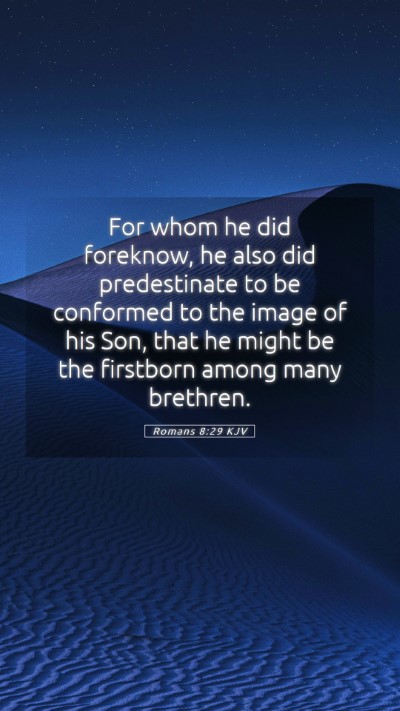Understanding Romans 8:29
Romans 8:29 states: “For whom he did foreknow, he also did predestinate to be conformed to the image of his Son, that he might be the firstborn among many brethren.” This verse is foundational in Christian theology, emphasizing both God’s sovereign will and the transformative purpose of a believer’s life.
Bible Verse Meanings
In exploring bible verse meanings, it is essential to understand the terms used in this verse. The phrase "foreknow" indicates God's intimate knowledge and predetermined relationship with His people before the foundation of the world. This is often seen as evidence of God's omniscience and sovereignty.
Bible Verse Interpretations
Various bible verse interpretations highlight that the act of “predestinating” is not merely about salvation, but it also implies a larger purpose: being molded into the likeness of Christ. As noted in Matthew Henry's commentary, it points to God’s eternal plan where believers are called to reflect the character of Jesus.
Bible Verse Understanding
The bible verse understanding reveals that being "conformed to the image of his Son" suggests a transformative journey. Believers are expected to undergo spiritual growth and develop qualities that reflect Christ's nature, including love, humility, and righteousness.
Bible Verse Explanations
In terms of bible verse explanations, Albert Barnes emphasizes that this calling is not just for a select few but includes all who believe. This gives hope and assurance to Christians, reinforcing the idea of community within the body of Christ, as seen in “that he might be the firstborn among many brethren.”
Bible Verse Commentary
From a bible verse commentary perspective, Adam Clarke elaborates on the concept of "firstborn." Jesus, as the firstborn, implies His preeminence over all Creation and His unique relationship with believers as brothers and sisters in faith. This indicates a shared inheritance among followers of Christ.
Scripture Analysis
Through careful scripture analysis, we can see that this verse encourages believers to embrace their identity in Christ. The transformative purpose behind God's foreknowledge is that believers are called to not only enjoy fellowship with God but also to manifest that relationship through their actions and character.
Biblical Exegesis
The biblical exegesis of this verse includes an examination of the Greek terms used. "Foreknow" (prognō) indicates a pre-established relationship, which underlines the depth of God’s love and commitment to His people.
Bible Study Insights
- Identity in Christ: Understanding our place as children of God and our call to be like Christ.
- God's Sovereignty: Emphasizing that God's plans cannot be thwarted and that He has a design for each believer.
- Transformation: Recognizing the need for personal growth and character building to embody the virtues of Christ.
Cross References
This verse relates closely with several other scripture passages:
- Ephesians 1:5: “Having predestinated us unto the adoption of children by Jesus Christ to himself, according to the good pleasure of his will.”
- 1 John 3:2: “Beloved, now are we the sons of God, and it doth not yet appear what we shall be: but we know that, when he shall appear, we shall be like him; for we shall see him as he is.”
- Philippians 3:21: “Who shall change our vile body, that it may be fashioned like unto his glorious body, according to the working whereby he is able even to subdue all things unto himself.”
Applying Bible Verses to Daily Life
Finally, in terms of applying bible verses to daily life, Romans 8:29 encourages believers to actively engage in their transformation process. It serves as a reminder of the importance of spiritual disciplines such as prayer, worship, and studying the word of God to become more like Christ and fulfill God's calling.
In conclusion, Romans 8:29 encapsulates significant themes in Christian doctrine—predestination, transformation, and community. By delving into its meaning, interpretation, and application, one can gain profound insights into the purpose of the Christian life and the nature of God’s relationship with His people.


